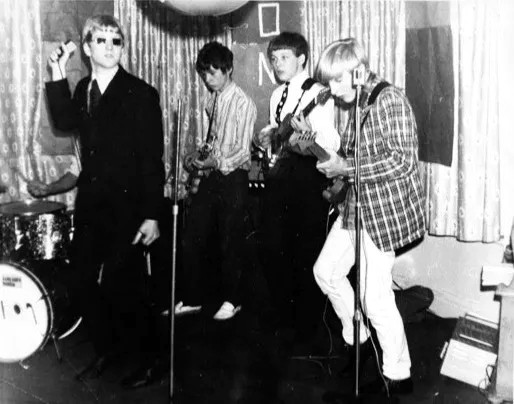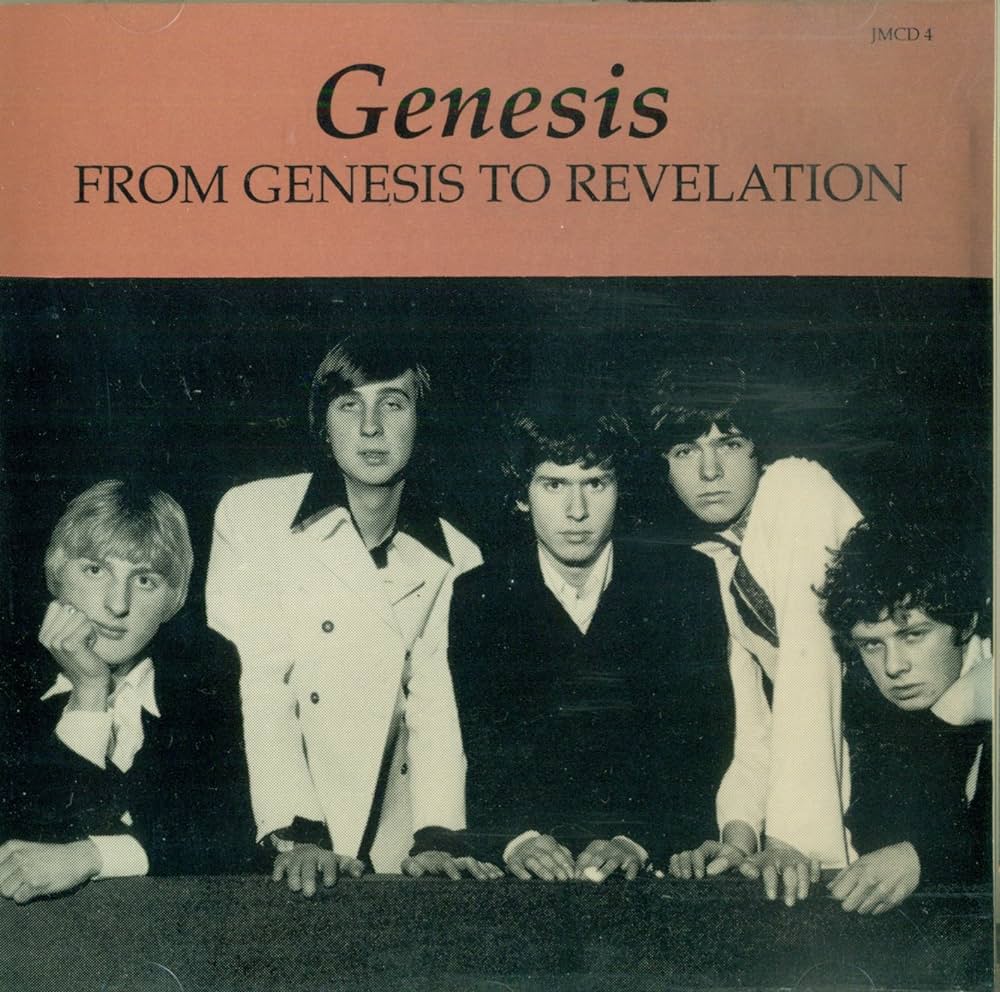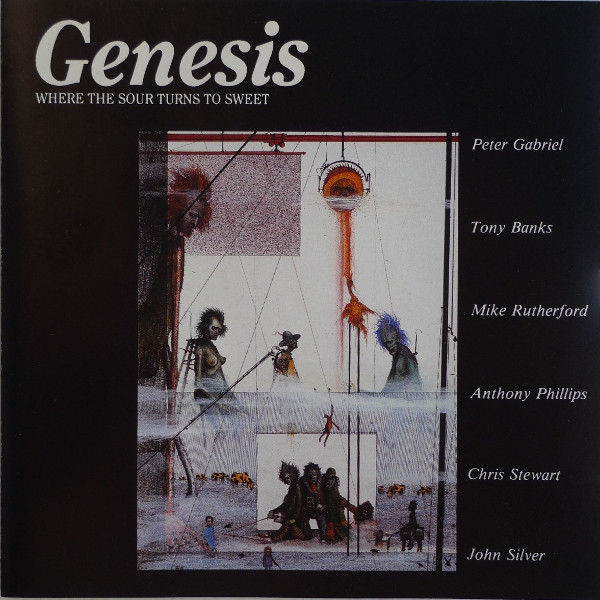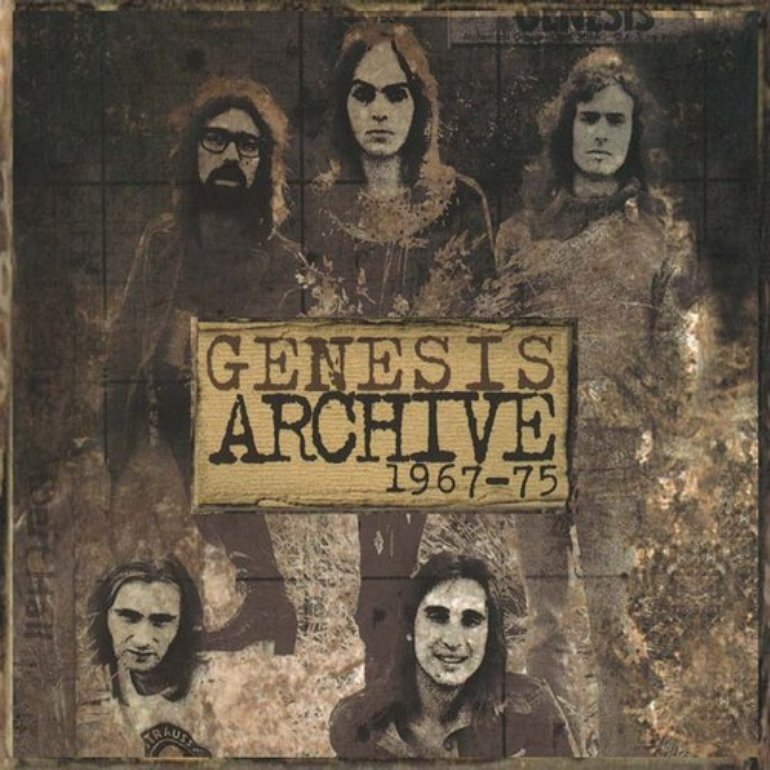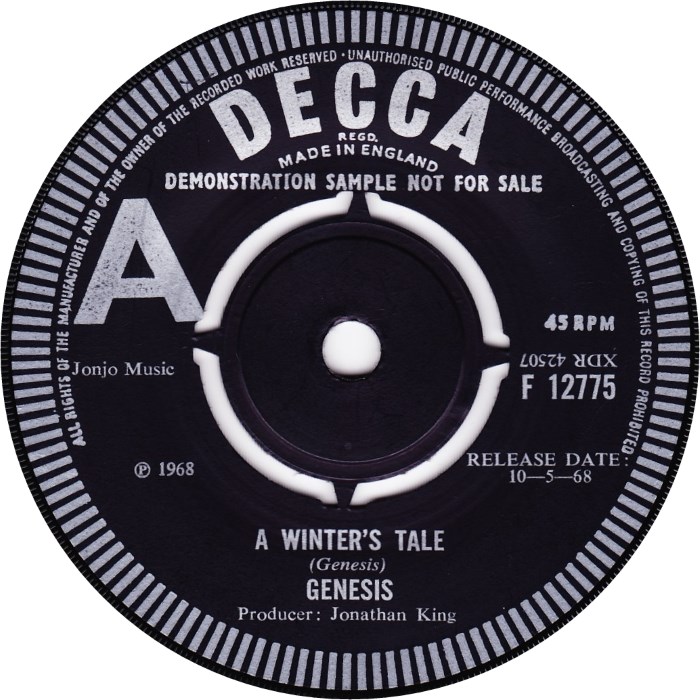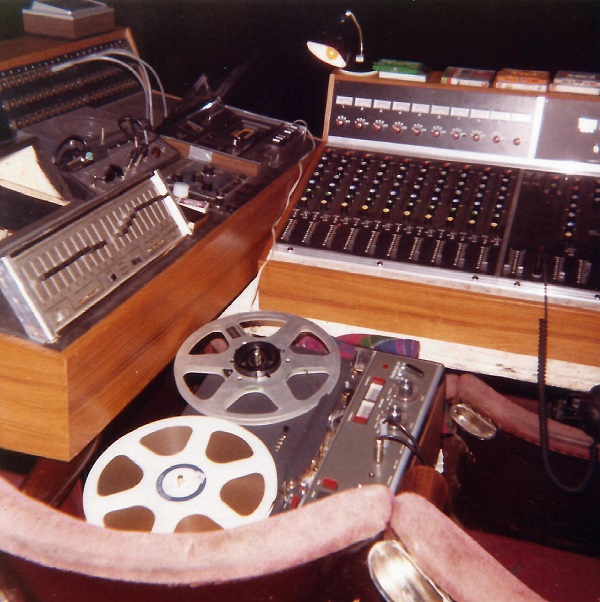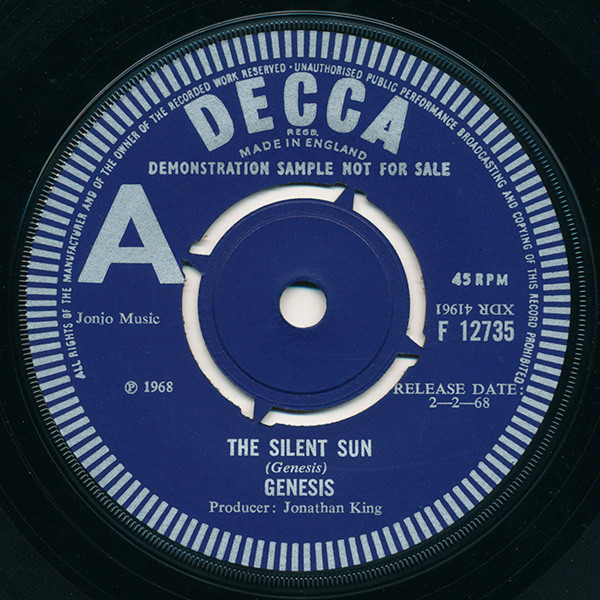Before Genesis became the iconic progressive rock band we know today, its roots lay in two school bands at Charterhouse School: Garden Wall and Anon. Among these, Anon brought together the talents of Anthony Phillips, Richard Macphail, Rivers Jobe, Rob Tyrrell, and a young Mike Rutherford. On December 16, 1965, Anon performed their first live gig—the humble beginning of a legendary musical journey.
Continue reading “The Genesis of Anon: Their First Live Gig on December 16, 1965”Trespass (1970) – Genesis
Genesis’s second album, Trespass, marked a turning point in their musical journey. Released in October 1970 on the Charisma label (and on ABC Records in the US), the album showcased a band finding its identity, blending folk, rock, and soul in ways that set them apart from their contemporaries. Recorded at Trident Studios in London under the guidance of producer John Anthony, Trespass was a bold step forward for Genesis, a band on the brink of discovering their iconic sound.
Continue reading “Trespass (1970) – Genesis”Anthony Phillips’s last gig with Genesis
On 18 July 1970, Genesis played their last show with founding member and guitarist Anthony Phillips at Haywards Heath.
Charterhouse and ‘The Anon’
Anthony Phillips joined Charterhouse, a public school in Godalming, Surrey, in April 1965. Being a guitarist, he quickly formed a band there with his fellow pupils Richard MacPhail, Rivers Jobe, Rob Tyrell and Mike Rutherford. They named themselves Anon and played songs by The Rolling Stones1, The Beatles and several other pop groups of the era. They performed mostly at parties.
The first member to bring in an own song into Anon was Anthony Phillips: ‘Pennsylvania Flickhouse’. They booked an hour of studio time at Tony Pike’s studio in Putney, as Richard MacPhail remembers: ‘We piled all the gear in Ant’s mother’s Mercedes and got on a bus and I thought ‘An hour, on my God, what are we gonna do with a whole hour? Each song’s three minutes long, that means we’re gonna get about nine songs done.’ We just got one done and we had huge rails with Mr Pike because everything was of course too loud and he said ‘You’re gonna ruin my equipment!’, all that classic stuff that went on in those days in recording studios.’2
In December 1966, the group disbanded.
Anthony Phillips in Genesis
In 1967, Ant and his friend and fellow guitarist Mike Rutherford began writing music together. To record a demo, they asked another Charterhouse pupil, Tony Banks, if he could play organ on a song. Tony agreed under the condition that his mate Peter Gabriel could also come along and sing one of their songs. Both of them had also played in a band at Charterhouse, The Garden Wall. Ant and Mike agreed and soon, former Garden Wall drummer Chris Stewart joined the group.
The demo tape was given to producer Jonathan King, who signed them to his publishing company and they recorded some singles. King then named the group Genesis, and the group recorded their first studio album From Genesis to Revelation (1969). Like on the singles, King added strings arranged by Arthur Greenslade to the mix. To their frustration, the band only found out about the strings when listening to the finished version of From Genesis To Revelation with only Ant Phillips showing his anger by storming out of the studio.
By mid-1969, the boys’ parents wanted them to resume education. At Charterhouse, Ant began studying for further A levels to pursue a university degree. But Ant and Mike had been gripped by rock and roll and decided to become professional musicians. By the end of the summer of 1969, Peter and Tony joined them in their wish to become full-time musicians. They began writing music and touring the country from late 1969 to early 1970. ‘Yet, something was lacking‘, it is said in the press kit of Ant’s first solo album, ‘Phillips, perhaps because he was younger than the others found that life on the road was getting in the way of his writing.’3
The unhappiness and the stress began affecting Ant’s health and also he began suffering from stage fright: : ‘I was in Watford Tech, I remember playing the opening thing of ‘Let Us Now Make Love’ and I looked at the guitar and I thought ‘I haven’t got a clue what comes next’ and then I saw myself playing, but it was really scary.’4 Rich MacPhail remembers him playing a gig at Hackney where Ant was almost catatonic.5
Ant battled with the stage fright for three months thinking it was a passing phase and then fell ill with bronchial pneumonia: ‘Doctors were advising me to leave [the band]6‘, Ant says.
In June 1970, Genesis recorded their second album Trespass. Ant enjoyed working in the studio, but in July, they went straight back into band-life with little sleep, a lot of excitement and although Richard MacPhail tried his best to nourish his mates, pretty basic food. They were travelling and sleeping in their bread van or on floors: ‘We literally pitched up somewhere in the Midlands and we had nowhere to stay’, Ant recalls. ‘Too far to go back and some guy said: ‘Well, I know a guy with a bloody big house in Buxton’ and we stayed on the drafted floor of a bloody big house in Buxton.’7
Anthony Phillips leaves the band
Finally, Ant decided to leave Genesis. ‘I remember driving out with with Richard MacPhail who said ‘Can we have a word with you?”, Mike Rutherford remembers. ‘To the pitch at Richmond rugby ground after a soundcheck. Light was falling, it was a weird atmosphere and Ant said he wanted to leave. It was a huge shock to me.’8 Ant’s last show was at Haywards Heath on 18 July 1970.
Tony Banks says: ‘I thought it was the end of the group. He was vital to its formation and in many ways he was the strongest member. We felt that whatever was special about us was a combination of the four of us being together in the same room so I assumed that when he left, that was it.’9
Losing Ant ‘was the closest we came to busting up’, Mike Rutherford agrees. ‘For some reason we felt so close that if one left, we thought we couldn’t carry on. Of all the changes we’ve been through, surviving Ant leaving was the hardest.’10
The aftermath
After Ant’s departure, Genesis did not disband, but his influence remained. The acoustic beginning of the ‘The Musical Box’, the opening song of their next album Nursery Cryme, was based on an instrumental guitar piece by Mike and Ant called ‘F Sharp’.
Ant himself went into a hiatus. ‘I left Genesis in a cloud of dust’, he says. ‘I remember I was listening to Sibelius when I had one those strange revelations – that I was terribly limited.’11 He started studying various musical styles and in 1974, he began teaching music as a means to further explore the subject. In 1977 he said: ‘In the time since I left Genesis, I’ve studied classical guitar, piano, orchestration.’12 That same year he released his first solo album The Geese And The Ghost. Anthony Phillips is still active as a musician today.
Title photo: Cover of one of the various editions of From Genesis to Revelation
Footnotes
- To this day, Ant sends Christmas cards to Richard addressed to ‘Mick Phail’. ↩︎
- RICHARD MACPHAIL INTERVIEW Revised : GENESIS early years ↩︎
- “The Geese and The Ghost Press Kit“. Passport Records. 1977. pp. 2–3. ↩︎
- ANTHONY PHILLIPS UNFILTERED: GENESIS C0-FOUNDER IN CONVERSATION ↩︎
- RICHARD MACPHAIL INTERVIEW Revised : GENESIS early years. In fact, Anthony Phillips has not played live to this day. ↩︎
- Cherry Red Interview: Anthony Phillips Story – Part 1 – Interview by Mark Powell – 2014 ↩︎
- ANTHONY PHILLIPS UNFILTERED: GENESIS C0-FOUNDER IN CONVERSATION ↩︎
- MIKE RUTHERFORD UNFILTERED: GENESIS GUITARIST/COMPOSER IN CONVERSATION. Now Revised ↩︎
- Bowler, Dave; Dray, Bryan, Genesis. A biography. (London: Sidgwick & Jackson, 1992), p. 35. ↩︎
- Ibid. ↩︎
- Hedges, Dan, ‘It’s that candour moment…’, Sounds (26 March 1977). ↩︎
- Ibid. ↩︎
Where the Sour Turns to Sweet (1969) – Genesis
In June 1969, Genesis released their third and final single for Decca Records: “Where the Sour Turns to Sweet” backed with “In Hiding.” It was intended to spark interest in their debut LP From Genesis to Revelation, but like its predecessors, it went largely unnoticed.
From Genesis to Revelation
By this point, Genesis had already released two singles on Decca: “The Silent Sun” and “A Winter’s Tale,” both in 1968 and both produced by Jonathan King. King also produced the band’s first full-length album, From Genesis to Revelation. The lineup at the time featured Tony Banks (keyboards), Peter Gabriel (vocals), Anthony Phillips (guitar), Mike Rutherford (guitar/bass), and John Silver (drums).
The album, loosely a concept work about the history of mankind, was still musically rooted in soft pop rather than progressive rock. Much to the band’s dismay, King added string arrangements to many tracks, softening the overall sound and steering it further from the band’s original vision.
Like the singles before it, the album failed to attract significant attention. In an effort to salvage interest, Decca decided to release a third single from the LP: “Where the Sour Turns to Sweet.”
Where the Sour Turns to Sweet
The track had actually been part of Genesis’s live repertoire for a while. Back in 1967, they recorded it, along with three other songs, during a one-hour session at Regent Sound Studios in London (where many rock legends had also worked). Jonathan King brought the young band in to record a demo, which was then sent to Decca. The label was impressed, and the band was signed.
They attempted to re-record “Where the Sour Turns to Sweet” at Advision Studios as their debut single, but the session was a disaster. Inexperience on both the band’s and producer’s parts led to the idea being shelved. Instead, “The Silent Sun” and “A Winter’s Tale” were released the following year, along with the full album in 1969.
Finally, on June 27, 1969, “Where the Sour Turns to Sweet” was released as a single (using the album version) with “In Hiding” as the B-side. It became Genesis’s third and last Decca single. Like the others, it failed to chart. There were even plans to release a remixed version of “In the Beginning” as a fourth single, but they never materialized.
Musical Highlights
“Where the Sour Turns to Sweet” opens with a bluesy piano phrase and finger snaps, giving it a laid-back, jazzy feel. Unfortunately, Arthur Greenslade’s added strings somewhat obscure the song’s raw energy. Peter Gabriel’s voice, even at this early stage, stands ou. His playful delivery and dynamic phrasing give the lyrics character and charm. It’s arguably one of the album’s standout tracks, though the fade-out feels abrupt and slightly uninspired.
Tony Banks and Tony Blackburn
Keyboardist Tony Banks once recalled being sent out to accost BBC DJ Tony Blackburn on the street to persuade him to play the single on his radio show (though Mike Rutherford claims that this was done when “A Winter’s Tale” was released.) “I told him, ‘Well, don’t play the A-side—play the B-side,’” Banks later said, referring to “In Hiding.” The situation was awkward for everyone involved, but the band was desperate enough to take the chance.
The End of the King Era
By the end of 1969, after three underwhelming singles and an album that missed the mark, Genesis was ready to move on. Jonathan King had taken the group as far as he could. The band withdrew to the countryside to reflect and write new music that would take them in a very different, much more adventurous direction.
Still, King left them with one important legacy: the name Genesis.
Archive I 1967 – 1975 (1998) – Genesis
In June 1998, Genesis released their first of two ‘Archive’ box sets: Archive 1967 – 1975 covers the era with Peter Gabriel as lead vocalist.
The plans to release ‘Archive’ box sets dated back to 1994
After the release of their last studio album Calling All Stations* in 1997, Genesis began putting together unreleased material from their history. The idea dated back to 1994. Originally there were plans to release three box sets. The first would have featured the Gabriel years, the second the period from the mid 1970’s to the early 80’s and the last the period from the mid 80’s to the early 90’s.
But over the years, there were delays and plans were changed. The recordings were released on two box sets, the first one being Archive 1967-75* , released in 1998, the second one being Genesis Archive 2 1976-1992*, released in 2000, which covers the era with Phil Collins on lead vocals. Both sets feature unreleased live performances, studio tracks and demo songs.
A complete live performance of The Lamb Lies Down On Broadway
Archive 1967 – 1975 is a box set that includes four discs. The mixing was done by Genesis producer Nick Davis. The first two discs feature a complete live performance of Genesis’ magnum opus The Lamb Lies Down on Broadway*. When the band toured the concept album in 1974/75, they played the whole double album. After this tour, Peter Gabriel left the band. The live performance in the box set is from The Shrine Auditorium, Los Angeles. Unfortunately, most of Peter Gabriel’s stories about the adventures of Rael between the songs were left out.
Peter Gabriel re-recorded his vocals at Real World Studios in 1995
Also, it is not a completely live recording. Peter Gabriel and former lead guitarist Steve Hackett re-recorded some of their parts in 1995. You can hear the difference in Gabriel’s voice if you compare the studio versions from 1974 to the live version on Archive I. Gabriel recorded his vocals at his Real World Studios. Also, the last song ‘It’, fades out because the tape machine at the Shrine ran out halfway through the song.
The live performance in general sounds more powerful than the studio version and the crowd seems to be enthusiastic. Apart from that, the songs are almost identical to the studio versions. The only exception is ‘The Waiting Room (Evil Jam)’, which was an instrumental with lots of space for improvisation that was therefore played differently every night. Apart from that, especially the title track, ‘Fly On A Windshield’ and ‘Carpet Crawlers’ stand out.
A live performance of ‘Supper’s Ready’ from 1973
Disc 3 includes live performances from the Rainbow Theatre in London, recorded on the Selling England By the Pound* tour in 1973. We finally get to hear songs like ‘Dancing With The Moonlight Knight’ and ‘Supper’s Ready’ live with Peter on vocals on an official release. Here, the stories are included. It also features a 1971 BBC recording of ‘Stagnation’ and b-sides and studio tracks from that era like ‘Twilight Alehouse’ and ‘Happy The Man.’
The last disc is the most interesting one, at least for the fans. It features songs from the band’s earliest period, still with Anthony Phillips on guitar. There are BBC sessions and many demo songs. You can hear the band becoming Genesis on this disc. Some of the tracks are real gems, from the early version of ‘Dusk’ to the appealing ‘Hey!’. There is an atmosphere in these early recordings that went missing after Ant Phillips left the band.
Apart from the four discs, there is a 82-page booklet which contains the band’s history and interviews with band members and associates.
So Archive 1967 – 1975 is a quite interesting box set. We finally get to hear official live versions of Gabriel-era songs sung by him. The only official live release with him had been Live* from 1973, which only covers songs from Trespass*, Nursery Cryme* and Foxtrot*. The inclusion of b-sides and unreleased studio tracks like ‘Twilight Alehouse’ make this box set special. Some would argue that disc 4 is only for the hardcore fans, but it also is the most surprising and most interesting of the four discs. Unfortunately some rare tracks and demos that are known to exist did not make it onto the box set. But all in all, Archive 1967-75 is an extraordinary release. Fans seemed to agree with that: It reached no. 35 in the UK charts in 1998.
The band met at Heathrow Airport to promote the release
To promote the release of Archive I, Genesis members past and present reunited for a photo shoot (and a following dinner) at Heathrow Airport in May 1998. There were Tony Banks, Peter Gabriel, Anthony Phillips, former drummer John Silver, Phil Collins, Steve Hackett and Mike Rutherford. The band’s first drummer Chris Stewart only made it to the dinner. Trespass-era drummer John Mayhew did not attend the event.
Genesis’ next ‘Archive’ release would be in 2000. It would be entitled Archive II 1976 – 1992 and feature the period with Phil Collins as lead vocalist.
*= affiliate link
A Winter’s Tale (1968) – Genesis
On 10 May 1968, Genesis released their second single. Like its predecessor – and its successor – it failed to make an impact. Here’s the story behind A Winter’s Tale.
In 1968, Genesis were still schoolboys. The four classmates from Charterhouse were in their late teens when producer Jonathan King offered them a record deal. Tony Banks (keyboards), Peter Gabriel (vocals), Anthony Phillips (guitar), Mike Rutherford (guitar and bass), and Chris Stewart (drums) agreed. King chose to produce their first album himself, and it was he who came up with the name “Genesis,” symbolising both the band’s beginning and the start of his own career as a producer.
The first singles
Genesis had been writing pop songs while still at school, but by the time they signed their deal, they were already moving towards more adventurous material. Jonathan King, however, preferred straightforward pop. So, to please him, Tony Banks and Peter Gabriel wrote The Silent Sun, a deliberate nod to the Bee Gees, which King loved and released as their debut single. It flopped.
A Winter’s Tale
For their second single, A Winter’s Tale, Tony Banks and Peter Gabriel again collaborated. Like The Silent Sun, it’s a love song, but here, the band sounds more confident, particularly in the soaring chorus. Once again, Peter Gabriel’s distinctive voice takes centre stage, rising above a lush (and somewhat overpowering) string arrangement. Even at this young age, Gabriel’s vocal strength hinted at the frontman he would soon become.
Unfortunately, A Winter’s Tale also failed to chart. It received little radio play and only a couple of published reviews. New Musical Express praised the song’s “pulsating crescendo” and thoughtful lyrics, but continued: “The melody could have done with a little more substance.”1
Mike Rutherford recalls in his autobiography that the band brainstormed ways to boost airplay. Peter Gabriel suggested they hand the single directly to BBC Radio 1 DJ Tony Blackburn. Tony Banks was tasked with waiting outside Broadcasting House. Nervous and unsure, he apparently came across a little too forcefully when Blackburn emerged – likely startling him and not helping their cause.2
From Genesis to Revelation
Shortly after the release of A Winter’s Tale, drummer Chris Stewart left the band and was replaced by John Silver, who would record their debut album From Genesis to Revelation. The album was an ambitious concept piece about the history of mankind, but musically, it still leaned far more towards soft pop than progressive rock. To the band’s disappointment, King added even more lush string arrangements, giving the album a gentle, almost easy-listening feel.
A third single, Where the Sour Turns to Sweet, followed, but like the others, it failed to chart. Eventually, the growing divide between King’s pop sensibilities and the band’s evolving musical ambitions led them to part ways.
What remains from this era is a fascinating and surprisingly strong collection of songs recorded by a band still in their teens. Among them is A Winter’s Tale, a glimpse of what was to come.
(And as a footnote for collectors: there’s a curious story about a cover version of A Winter’s Tale by Rita Pavone’s brother – but that’s a tale for another time.)
Live at the Roundhouse 1970
On March 11, 1970, Genesis played one of the most significant gigs of their early career at the Atomic Sunrise Festival at London’s legendary Roundhouse. The event, sponsored by Yoko Ono, featured artists such as David Bowie and Hawkwind. Just weeks later, Genesis signed their first major record deal with Charisma Records.
Genesis in Early 1970
At the start of 1970, Genesis were busy writing and rehearsing new material for their second album. Their debut album had failed to chart, and they had parted ways with producer Jonathan King and Decca Records. Determined to take a new direction, the band moved away from the pop-oriented style of their first record and embraced a more adventurous, experimental sound. At the time, Genesis consisted of: Peter Gabriel (vocals), Tony Banks (keyboards), Ant Phillips (lead guitar), Mike Rutherford (guitar and bass) and John Mayhew (drums).
Opening for David Bowie at the Roundhouse
Still an unknown band, Genesis saw the Atomic Sunrise Festival as a huge opportunity – especially since they were set to open for David Bowie.
Both Tony Banks and Peter Gabriel were big Bowie fans. Space Oddity had been released the previous year, and Bowie was already a rising star. His live shows at the time were highly theatrical, something that fascinated Gabriel. A few years later, Genesis would gain recognition for their elaborate stage performances, partly inspired by Bowie’s dramatic approach.
However, not everyone in the band was equally enthusiastic. While Gabriel was impressed by Bowie’s visuals, Banks felt that the theatrical elements took too much attention away from the music. This difference in perspective would later lead to tensions within Genesis, especially as Gabriel began incorporating costumes and masks into their own performances – something that divided opinions among the band.
The Atomic Sunrise Festival and Yoko Ono’s Involvement
At the Atomic Sunrise Festival, Genesis performed songs that would later appear on their second album, Trespass, including “Looking for Someone” and “The Knife” – both of which were captured in surviving video footage. It is also believed that they played “Twilight Alehouse”. In later interviews, Ant Phillips joked that this footage is the only visual proof that he ever performed with Genesis.
Despite the significance of the gig, the band’s experience was not entirely positive. Gabriel recalled that there were more people on stage than in the audience, and Phillips was so nervous that he could barely play – a stage fright that would later contribute to his decision to leave Genesis.
Still, both Banks and Phillips were impressed by the professionalism behind the scenes. Every performance at the festival was recorded on 8-track equipment, and parts of it were filmed. Since the event was backed by Yoko Ono, there’s a possibility that the full footage still exists somewhere in the Apple Records archives.
A few weeks after the show, Genesis signed with Charisma Records, and by the end of the year, they released Trespass. But changes were already on the horizon – Ant Phillips left the band, and a new drummer joined in the summer of 1970… but that’s a story for another time.
Title photo: Genesis mixing desk 2 – Revox A77 and associated gear for Genesis at a concert in the Liverpool Empire, 1970s, precise year unknown. Source: Wikimedia Commons, Rodhullandemu / CC-BY-SA-2.5 (https://creativecommons.org/licenses/by/3.0).
The Silent Sun (1968) – Genesis
In February 1968, Genesis released their debut single, The Silent Sun, on Decca Records. At just 17 years old, Peter Gabriel was already making his mark. Let’s take a closer look at the band’s very first single!
Genesis at Charterhouse
In 1968, Genesis were still students at Charterhouse School. Tony Banks, Peter Gabriel, Mike Rutherford, and Anthony Phillips had formed the band as a way to escape the constraints of school life. At the time, the group operated as two songwriting pairs: Banks and Gabriel on one side, Phillips and Rutherford on the other.
While still at school, they recorded demos and sent them to Jonathan King, a former Charterhouse student who had found success as a musician and producer (his best-known hit being Everyone’s Gone to the Moon). King was particularly impressed by Peter Gabriel’s voice and signed them to Decca Records, intending to produce a full album. However, when the band presented their next batch of demos, he wasn’t impressed.
A Producer Who Loved The Bee Gees
Jonathan King wanted the band to deliver a potential hit. Knowing he was a fan of The Bee Gees, Peter and Tony deliberately wrote a song in their style—The Silent Sun.
‘I tried my best Robin Gibb impersonation,’ Peter later joked.1
King loved it and made it their debut single, later including it on the band’s first album, From Genesis to Revelation.
Musically, The Silent Sun blends folk and pop, with Tony Banks’ piano already playing a central role. The song primarily highlights Peter’s vocals, with orchestral strings added later by King in the studio. It’s also one of the rare official Genesis recordings to feature their original drummer, Chris Stewart.
‘We had been drilled by Jonathan King to write short pop songs, which I resisted,’ Anthony Phillips recalled. ‘I didn’t like The Silent Sun at all.’ He later reflected that it was probably for the best that the song wasn’t a hit: ‘If it had been successful, the band would never have developed its proper style.’2
Tony Banks, however, believed it had the potential to be a great hit. For Peter Gabriel, seeing the name Genesis in Record Mirror was a career-defining moment, while Mike Rutherford fondly remembers the thrill of hearing The Silent Sun on the radio for the first time in Anthony Phillips’ kitchen.
Reviews and Reception
Upon release, the Decca catalogue described The Silent Sun as ‘quietly attractive.’’.3 New Musical Express praised its ‘beautiful flowing arrangement of violins and cellos,’ though they speculated it ‘might be a bit too complex for the average fan.’4
A Single That Failed but a Band That Flourished
Despite their enthusiasm, The Silent Sun failed to chart. The accompanying album, From Genesis to Revelation, was also a commercial failure. Eventually, Genesis parted ways with Jonathan King, allowing them to explore a more adventurous and distinctive musical direction.
As the band gained fame, King repeatedly re-released these early recordings in various formats, capitalizing on Genesis’ later success. But for Genesis themselves, The Silent Sun remains a fascinating footnote in their history—their first step on the road to greatness.
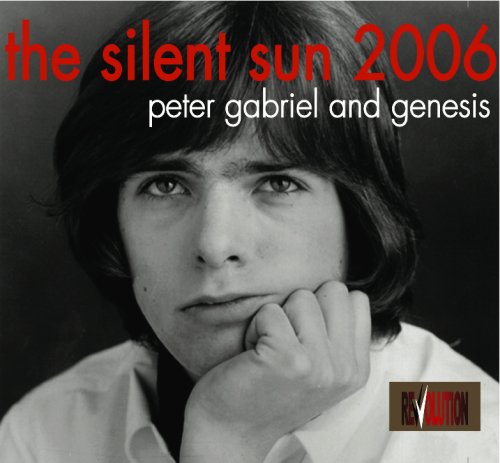
Sources
GENESIS REUNION 2014: THE THREE. Part ONE. NOW FULL UNCUT VERSION ! + improved audio!
Thompson, Dave, Turn it on again. Peter Gabriel, Phil Collins & Genesis. (San Francisco: Backbeat Books, 2005).

